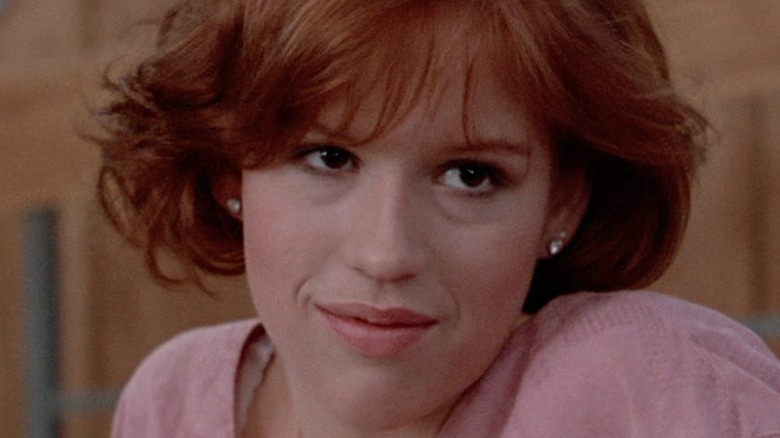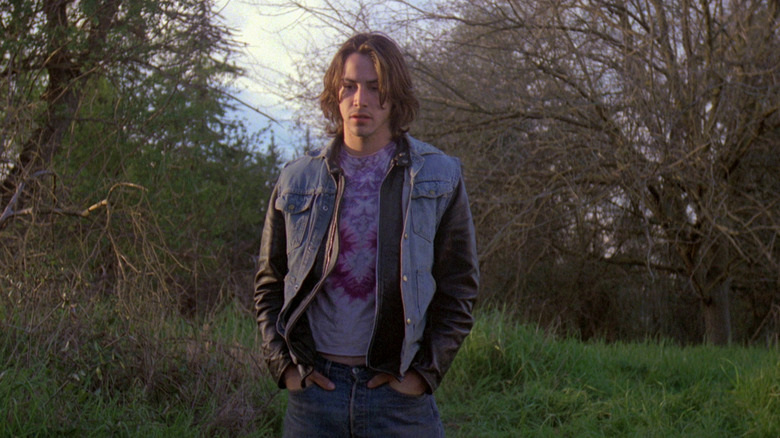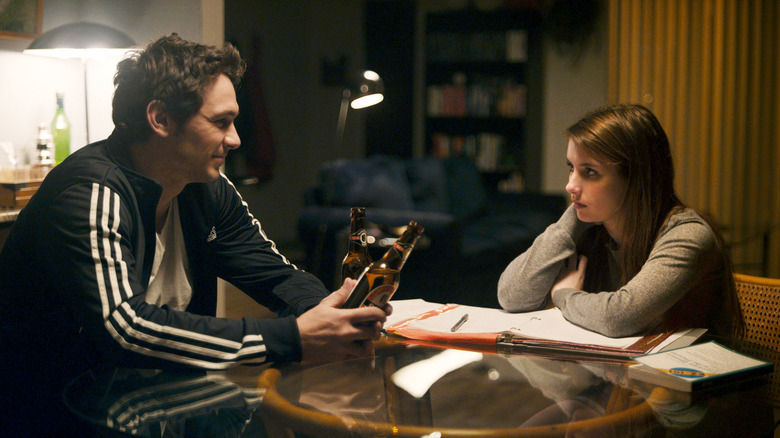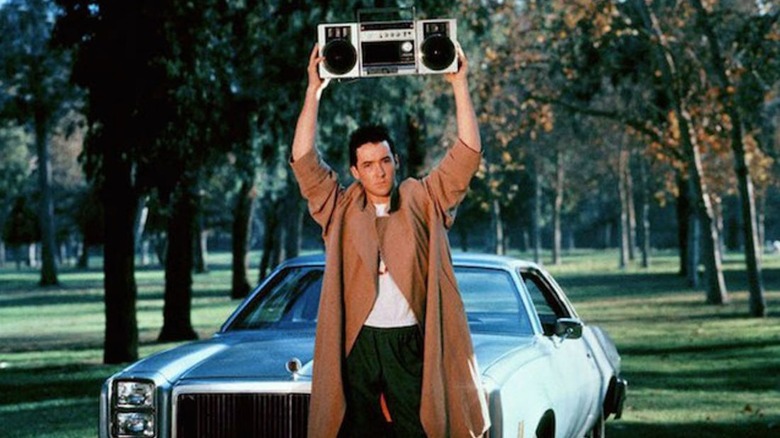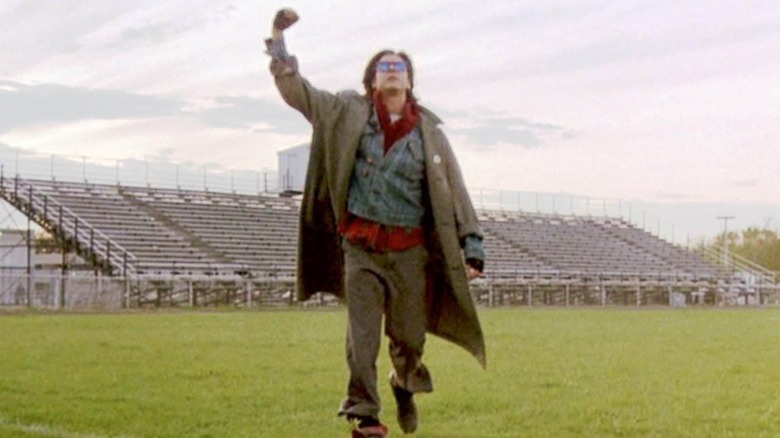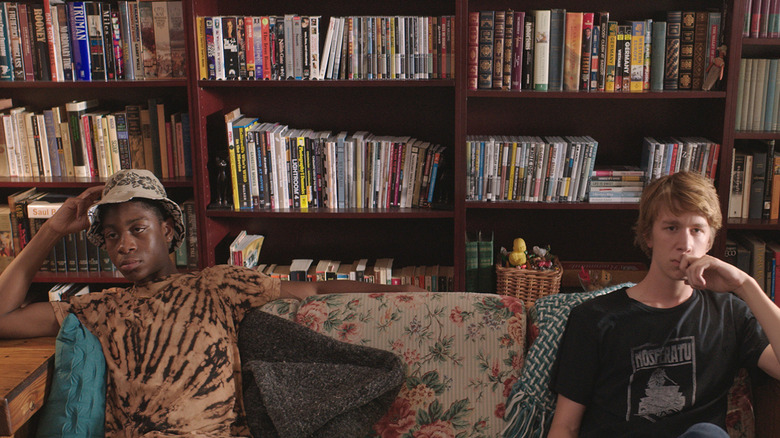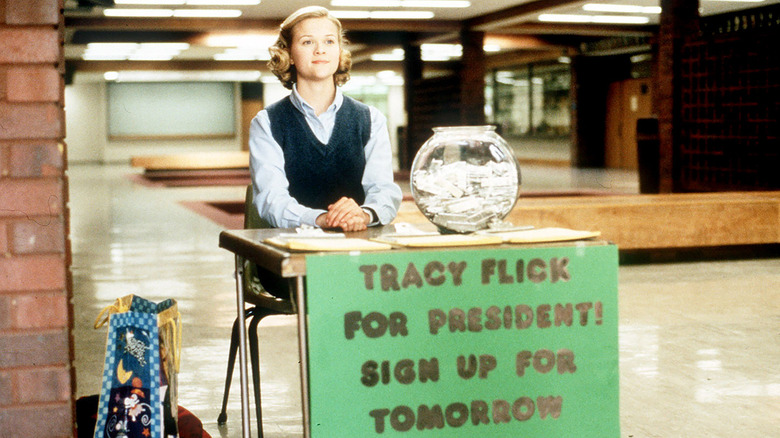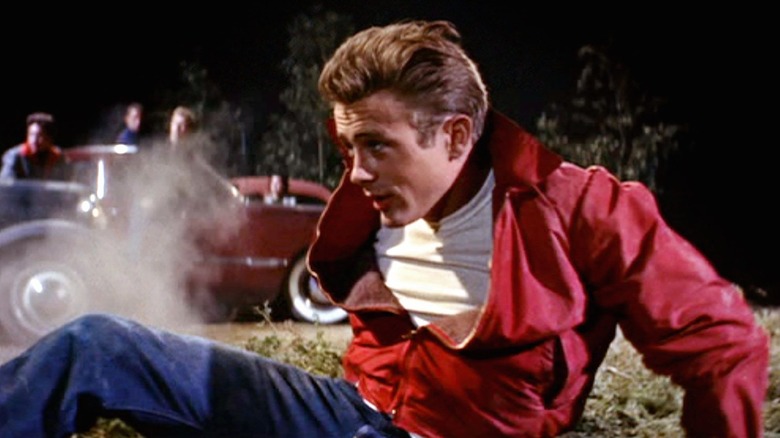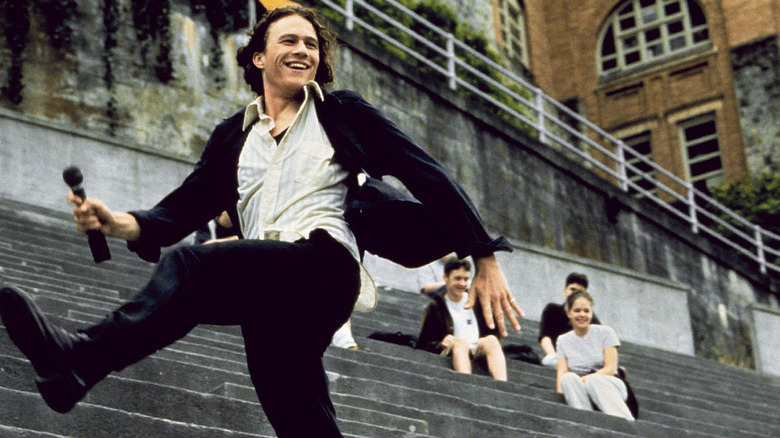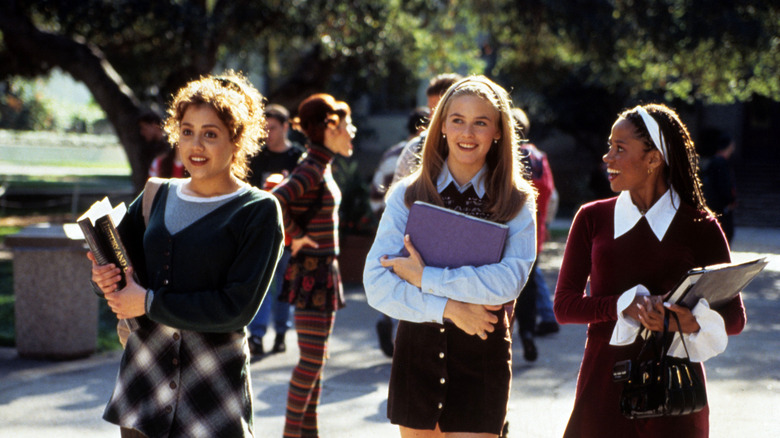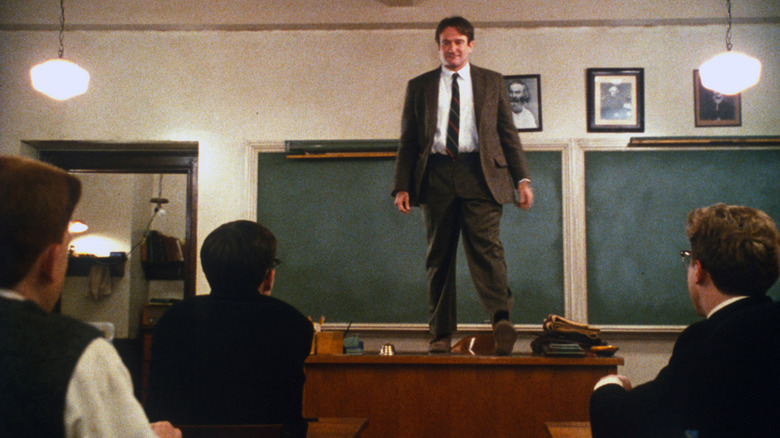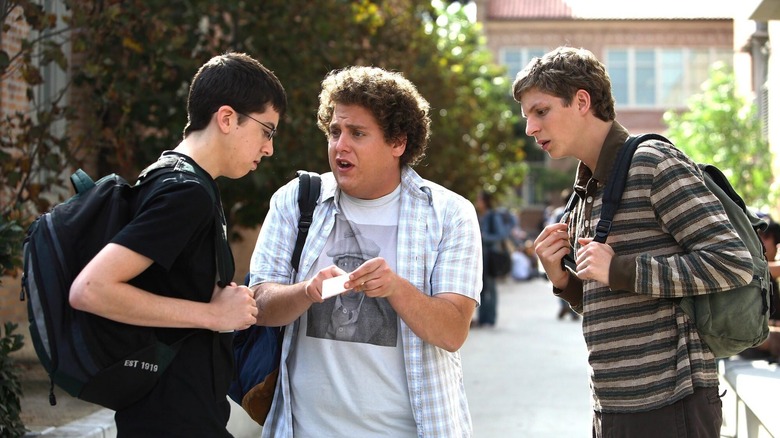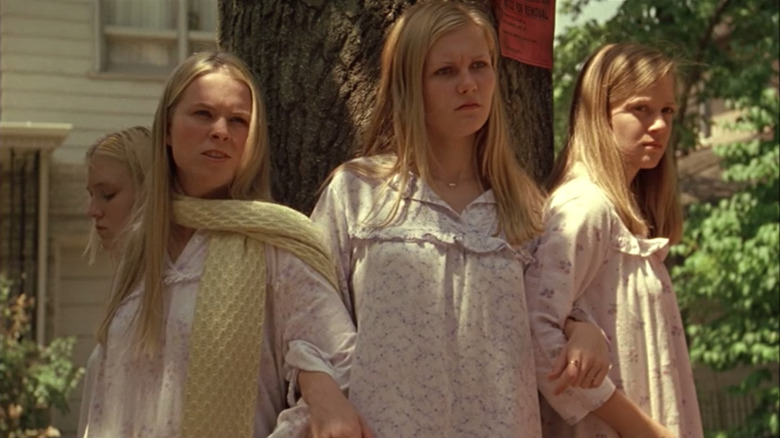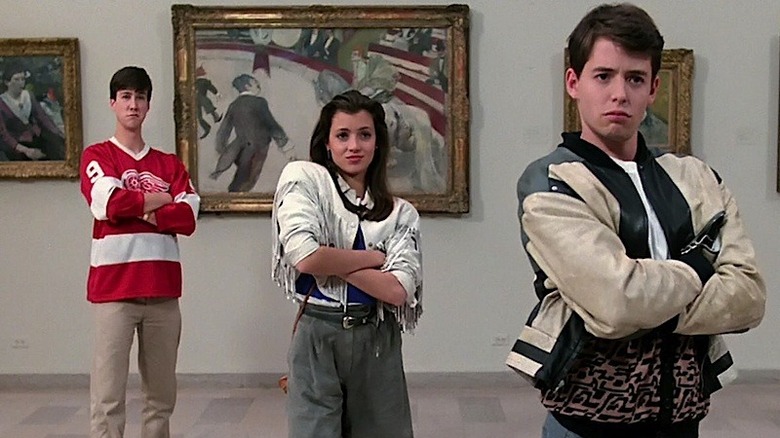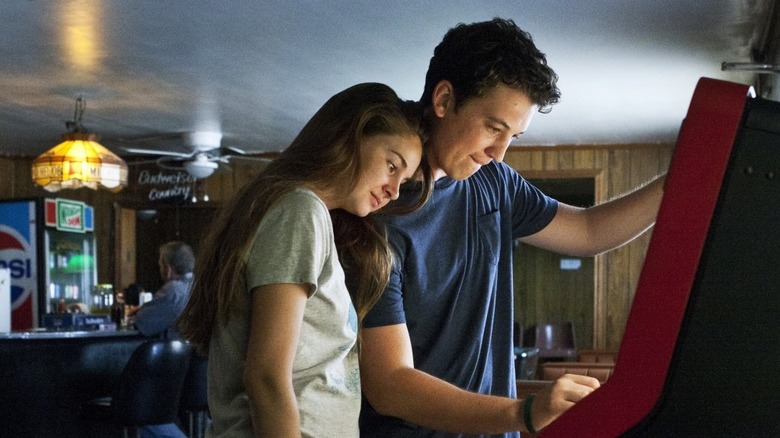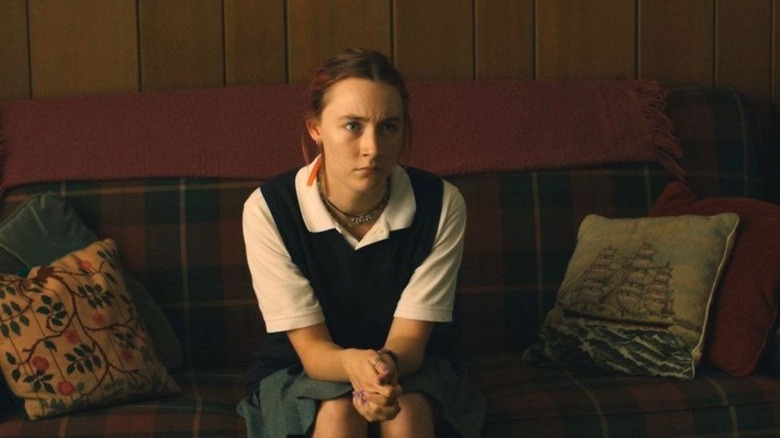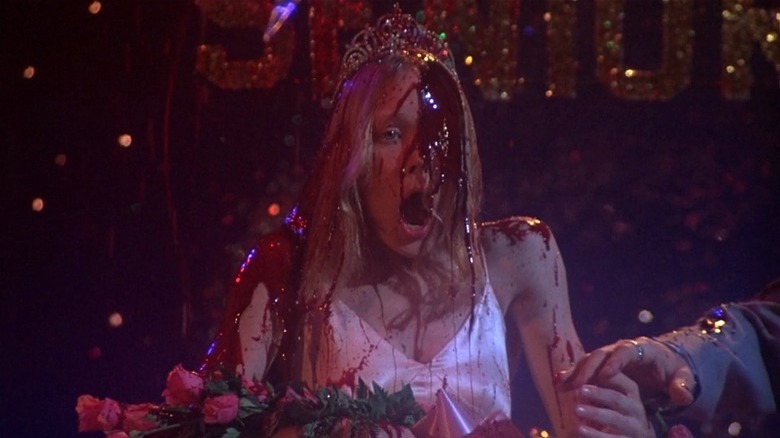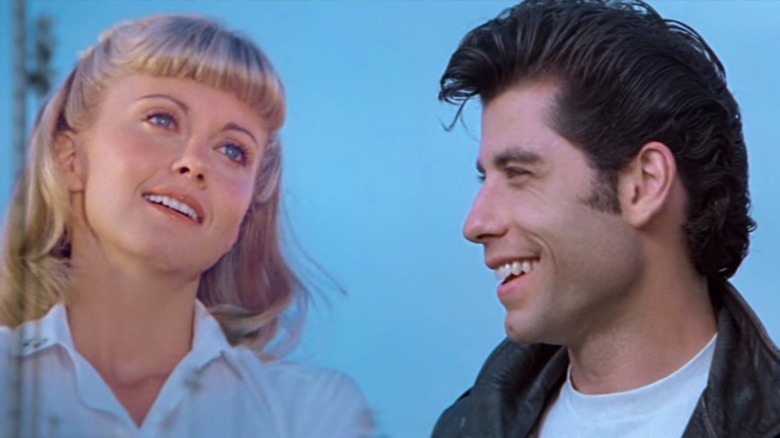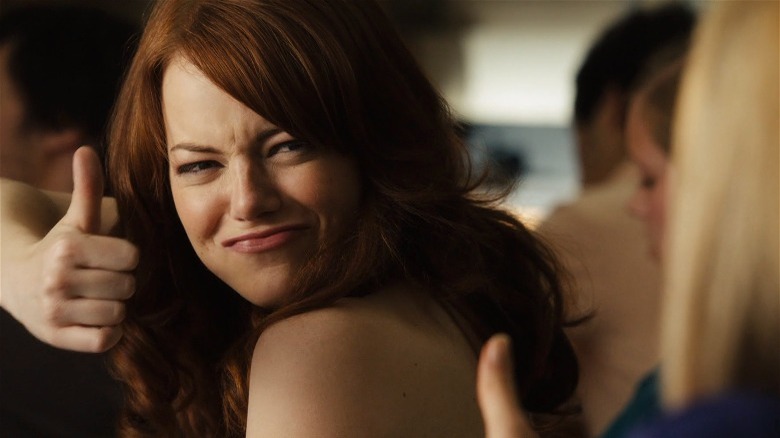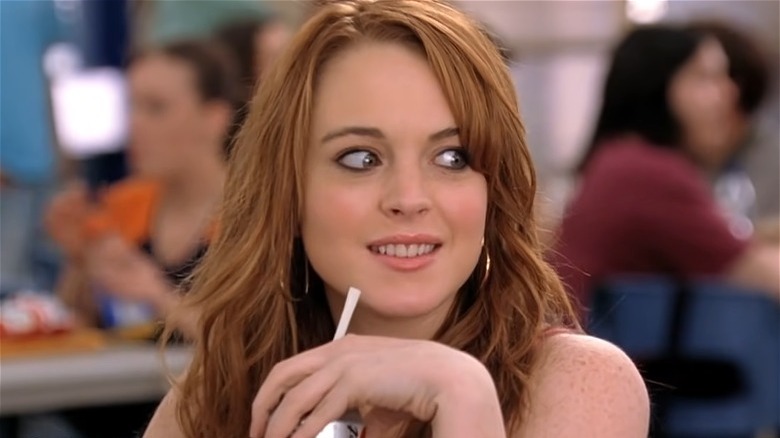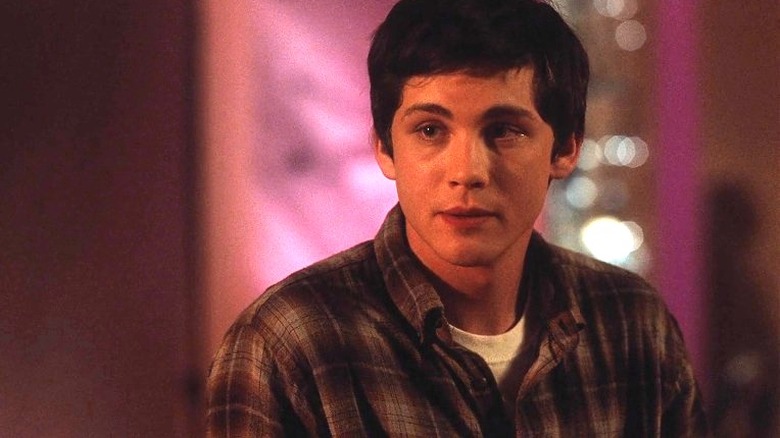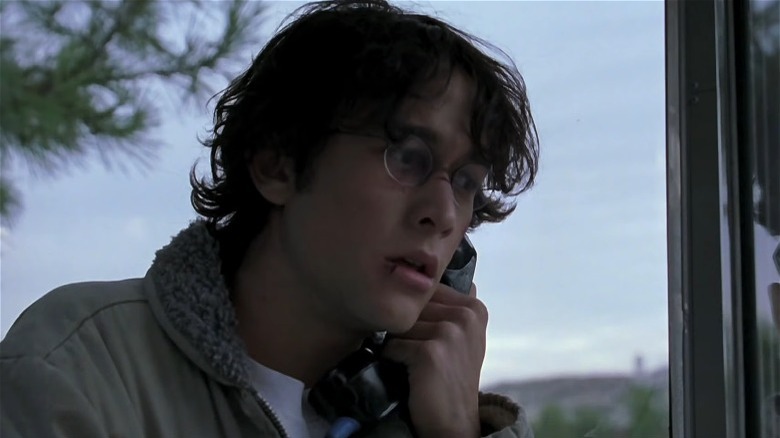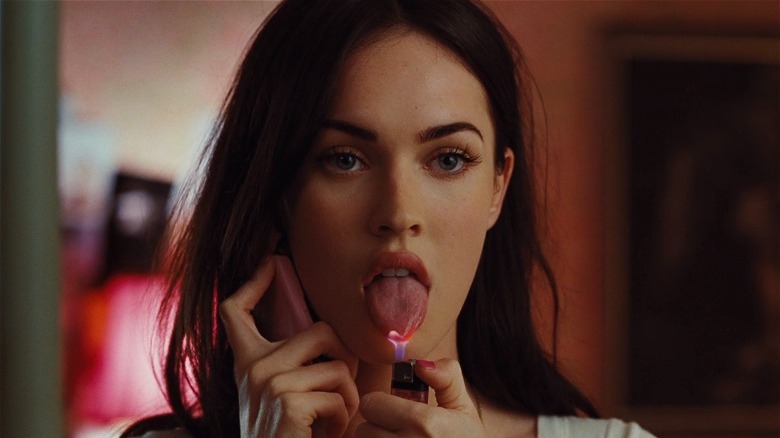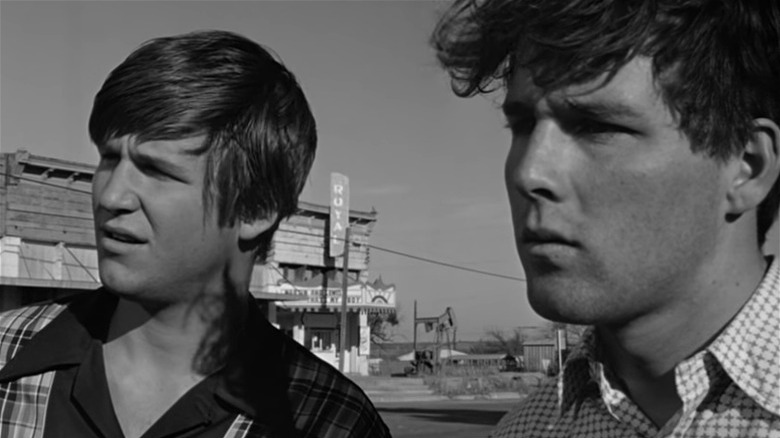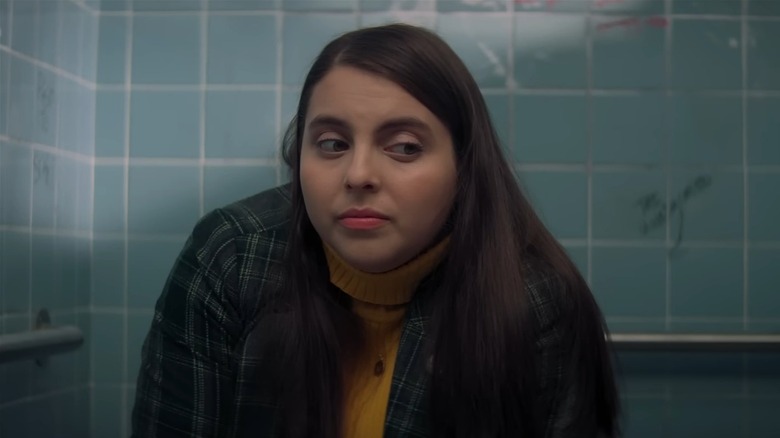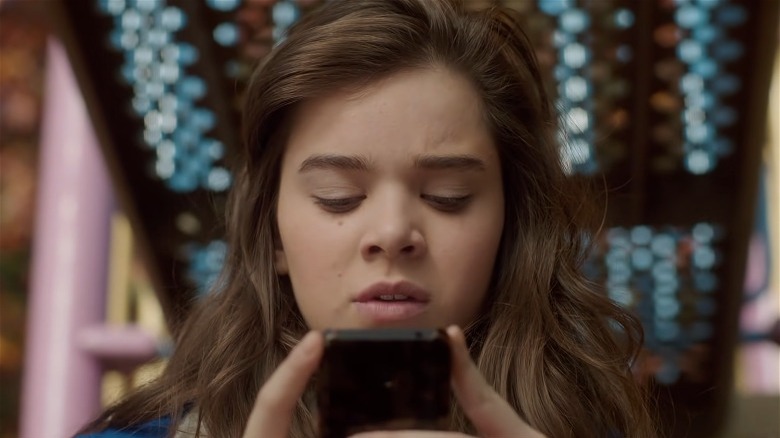25 Essential Movies About High School You Need To See
The high school experience is a fixture of coming-of-age films, as heightened emotional states and specific pressures give the transition from childhood to adulthood unlimited storytelling potential. Great high school movies cross many different genres, but always come down to the specific, yet somehow universal, challenges that teenagers face.
John Hughes is the filmmaker most closely associated with high school movies thanks to his groundbreaking work in the '80s to accurately depict these pivotal years. Hughes generated empathy for his characters by taking their fears and desires seriously, and his films launched the careers of many great young stars. While specifically catered towards teenagers who saw themselves in the characters, older viewers also were able to use Hughes' films to reminisce on their own youth. The genre has opened up in subsequent years to reflect diverse audiences, with recent hits such as "Booksmart," "The Edge of Seventeen," and "The Hate U Give."
These are the movies about going to high school you need to see.
River's Edge
"River's Edge" is one of the darkest high school films ever made. The film follows a group of Northern California teenagers who discover that their lifelong friend John (Daniel Roebuck) murdered his girlfriend Jamie (Danyi Deats), and they're forced to hide the secret. Watching the naïve characters wrestle with the violent crime and consider how they've misjudged their former friend makes "River's Edge" a shocking coming-of-age story about the loss of innocence.
The entire ensemble is terrific, but the film's breakout star was Keanu Reeves as the stoner Matt. Matt has a dour attitude towards his prospects for his future, but despite his clashes with law enforcement, he hides a sensitive side. Matt's romance with Clarissa (Ione Skye) is challenging, as despite their affection for each other, neither feels like they can walk among their classmates again. Matt develops responsibility as he learns to protect his brother Tim (Joshua John Miller) from heading down a violent path.
Palo Alto
"Palo Alto" meditates on fleeting youthfulness through delicate reflection. The characters that populate a California high school are isolated by their struggles, and in her promising debut writer-director Gia Coppola reflects on the challenges young people have communicating their anxieties. Soccer star April (Emma Roberts) is flustered by the romantic advances of her coach Mr. B (James Franco), but nonetheless agrees to babysit his children. The stoner Teddy (Jack Kilmer) wreaks havoc on his community alongside his best friend Fred (Nat Wolff), but a shocking accident forces Teddy to face the consequences of their actions alone.
Coppola's hazy, dreamlike cinematography finds moments of beauty amidst the teens' lives, and the overtly poetic dialogue is well-suited for the naïve characters. The film depicts disturbing events, particularly as Fred descends deeper into addiction and Teddy is forced to end their relationship. However, as April and Teddy find each other amid the chaos, "Palo Alto" offers a window of hope.
Say Anything...
Cameron Crowe's directorial debut is a refreshingly earnest, uncynical depiction of a high school love story. Crowe reimagines a classic "Romeo and Juliet" story through the seemingly unlikely romance between underachiever Lloyd Dobler (John Cusack) and class valedictorian Diane Court (Ione Skye). These characters could have been stereotypes, but Crowe gives them unexpected depth; Dobler isn't malicious or lazy and Diane isn't a stuck-up, secluded princess, and both learn to understand each other.
Cusack would come to be known for his quick wit following "Say Anything...," and it's interesting to see him here as a character whose fast talking isn't driven by snark. He's the rare '80s male protagonist who supports his love interest whole-heartedly, encouraging Diane to pursue her internship in Britain and comforting her during the film's final moments. The scene of Cusack standing outside of Diane's window with a boombox blasting "In Your Eyes" is one of the great romantic moments in movies, high school or otherwise.
The Breakfast Club
Hughes' most famous film builds off of the notion that every person is an individual, despite what stereotypes may indicate. Hughes took five familiar archetypes and created a situation in which they were forced to interact, with each character's empathy growing as they hear about someone else's experience.
The troublemaker Bender (Judd Nelson), spoiled rich girl Claire (Molly Ringwald), promising athlete Andrew (Emilio Estevez), geeky Brian (Anthony Michael Hall), and basket case Alison (Ally Sheedy) are kept in their school's library for an entire Saturday by their overbearing Vice Principal Vernon (Paul Gleason). Vernon assigns each of them the task of each writing a personal essay. While the five are aware of each other in passing, they've never taken the time to get to learn about one another and discover that they have a lot in common. While their situations are different, each one struggles with the burdens placed on them by their parents, and seeks to break out of the singular trait that they've become known for.
"The Breakfast Club" balances comedy and drama. There are plenty of laugh-out-loud moments as the group gets high and defaces school property, but in the film's most famous scene they sit down for an intimate conversation and share their secrets. The unlikely friendship empowers its adolescent audience, proving that there's more to a person than the social clique they belong to.
Me and Earl and the Dying Girl
Few films are better suited for a cinephile audience than "Me and Earl and the Dying Girl," which shows how filmmaking can drive creativity and offer solace during challenging times. Author Jesse Andrews adapted his own hit novel for a reference-laden story about high school outsiders bound by their love of movies.
Greg (Thomas Mann) and Earl (RJ Cycler) learn about cinematic classics from their unusual teacher Mr. McCarthy (Jon Bernthal), and work on a shoestring budget to remake their favorite movies — with a twist. "Apocalypse Now" becomes "A Box of Lips Now." "My Dinner With Andre" becomes "My Dinner With Andre The Giant." Greg and Earl's limited abilities produce terrible parodies. However, Greg and Earl take on a more serious endeavor when their classmate Rachel (Oliva Cooke) is diagnosed with terminal cancer; although Greg only talks to Rachel out of obligation at first, the trio become friends, and Greg and Earl decide to create a special film for Rachel before she dies.
While high school films about life with cancer like "The Fault in Our Stars" were popular when "Me and Earl and the Dying Girl" came out, the film's dark sense of humor allows Rachel to laugh at her situation. The voiceover from Greg satirizes clichés in high school movies, but the emotional conclusion shows the power movies have to heal.
Election
"Election" is one of the quintessential movies about politics, but it's not about the Presidency. Alexander Payne's 1999 comedy depicts the fraught battle for the student body leadership role in a Nebraska high school. The process of building a campaign, courting voters with misleading promises, developing political alliances, and even vote tampering are all lampooned through a youthful perspective.
High-strung overachiever Tracy Flick (Reese Witherspoon) has been preparing for this election for her entire life, and is desperate to impress her teachers. Civics teacher Jim McAllister (Matthew Broderick) despises Tracy and is annoyed by her wealthy upbringing and plastic persona; Jim is also wary of Tracy's relationship with his best friend Dave (Matthew Novonty), which got Dave fired. Scheming to steal the election from Tracy, Jim inspires the unassuming doofus Paul Metzler (Chris Kein) to run as Tracy's rival. Despite having no ambition and being generally clueless, Paul amasses a big following.
"Election" examines the latent forces that influence politics, as Paul is only Jim's puppet, and the teen's minimal knowledge of policy is humorous. Witherspoon finds the right balance between irritating and hilarious, and Broderick's inherent awkwardness is well utilized as a devious character.
Rebel Without A Cause
Despite only starring in three films before his tragic death at age 24, James Dean's rebellious attitude defined a generation. While he gave great performances in "East of Eden" and "Giant," it was Dean's performance in "Rebel Without A Cause" that made him the face of a social movement. Dean represented a youthful audience who felt misunderstood by older generations and limited by existing social structures. While it's easy to dismiss these feelings as teenage angst, Dean brought adolescents' inability to reach out for help to striking, moving life.
Dean stars in "Rebel Without a Cause" as Jim Stark, a teenager who moves to Los Angeles with his parents and is instantly arrested and placed in a youth detainment center for his rambunctious behavior. Jim bonds with Judy (Natalie Wood), who helps the quiet loner make it through his first few weeks of school. Jim is sensitive and cares for the similarly troubled boy Plato (Sal Mineo). However, his classmates goad him into violence, and Jim's teachers grow wary of him. In a breakthrough moment, Jim finally gains his parents' acceptance.
10 Things I Hate About You
Some high school students may complain about reading William Shakespeare plays in English class, but the 1999 comedy "10 Things I Hate About You" shows there's nothing old-fashioned about the Bard. This film takes the essential story beats of Shakespeare's "Taming of the Shrew" and reimagines them as the basis for a modern romantic comedy.
Cameron James (Joseph Gordon-Levitt) enters a new school and instantly falls in love with the young and popular Bianca Stratford (Larisa Oleynik). Cameron learns from his new friend Michael Eckman (David Krumholtz), a Shakespeare expert with an encyclopedic knowledge of their school's social classes, that Bianca will only be allowed to date if her standoffish sister Catherine (Julia Stiles) does so first. Catherine is fiercely independent, but Cameron decides to recruit the school's rebellious hooligan Patrick (Heath Ledger) to capture her heart. The situation grows complicated as Patrick and Catherine grow to start to care for each other, while the scheming Joey Donner (Andrew Keegan) attempts to steal Bianca from Cameron.
"10 Things I Hate About You" launched all of these young performers into stardom. It's fascinating to see the oddball comedy turn from Ledger, who would be known for his more serious roles.
Clueless
Just like "10 Things I Hate About You" reimagined Shakespeare's story as a teen rom-com, 1995's "Clueless" was inspired by Jane Austen's "Emma." Austen's 1815 novel satirized the notions of romantic misunderstandings within high society in England, and "Clueless" took those themes and transported them to Beverly Hills. The language is similarly eloquent; Austen's novel meticulously captures era-specific phrases and grandiose romantic profusions, while "Clueless" uses Los Angeles slang to create an accurate depiction of '90s teen culture.
Beyond the Austen influence, "Clueless" is best known for Alicia Silverstone's star-making performance. Silverstone leads the film as Cher Horowitz, an affluent and wealthy teenager who enjoys playing matchmaker with her classmates and teachers. Cher looks down on her peers' superficial desires, and with her best friend Dionne Davenport (Stacey Dash) decides to take their school's awkward geek Tai Frasier (Brittany Murphy) and give her a makeover. Cher becomes jealous when Tai's popularity rivals her own, but she's comforted by the older Josh Lucas (Paul Rudd), an intern working for her father Melvin's (Dan Hedeya) law practice.
"Clueless" is hilarious thanks to Silverstone's witty performance, and she and Rudd have great chemistry. Despite thinking of Josh as a boring older brother, Cher discovers that he knows her much better than she thinks.
Dead Poets Society
Teachers are often cast as the villains in high school movies; while Hughes' films certainly flesh out their adolescent heroes, they rarely depict educational figures as three-dimensional characters. "Dead Poets Society" is an exception to this trend that shows the power of a great teacher to inspire, educate, and create a connection with their students. The film shows how social limitations diminish students' willingness to learn, and how discouraging it can be for teachers when they're forced to abide by a set curriculum.
In one of his most endearing performances of all time, Robin Williams stars as John Keating, an English teacher who is hired by an elitist male-only prep school in Vermont. The academy is highly conservative and discourages freedom of expression, but Keating contradicts their rules and assigns his students authors who he thinks will expose them to different perspectives. Inspired by their newfound appreciation of literature, Keating's top students Todd (Ethan Hawke), Neil (Robert Sean Leonard), Knox (Josh Charles), Richard (Dylan Kussman), Steven (Allelon Ruggiero), Gerard (James Waterston), and Charlie (Gale Hansen) form a secret society with Keating as their model. However, the boys' breakthroughs are condemned by the school's authority figures, who demonize Keating and threaten to dismiss him.
Superbad
Seth Rogen and Evan Goldberg began outlining the story of "Superbad" when they were in high school themselves, and when the film finally made it to screen, its madcap hijinks shocked audiences. "Superbad" captures the 21st century high school experience and the superficial desires of teenage boys in hilariously accurate detail, but despite its raunchiness, the story is genuinely heartfelt. It's ultimately about two friends who don't want to leave each other behind.
Best friends Evan (Michael Cera) and Seth (Jonah Hill) spend nearly every moment together, but they're set to attend different colleges after graduation. Trying to make the most of the last days of their senior year, the boys see an opportunity to find love at an upcoming party. Evan has a longstanding crush on Becca (Martha MacIsaac), and, after a surprising school assignment, Seth falls for the popular girl, Jules (Emma Stone). The pair decide that the only way to distinguish themselves is to get alcohol for the party, so the boys enlist their friend Fogell (Christopher Mintz-Plasse) to get a fake ID card, which accidentally reads "McLovin."
"Superbad" gets even more wacky as Fogell is taken under the wing of two oddball police officers, Slater (Bill Hader) and Michaels (Rogen). However, "Superbad" never forgets its emotional undercurrent, and Evan and Seth's last conversation is quite touching.
The Virgin Suicides
Sofia Coppola is one of the best filmmakers working today. By this point, her name is synonymous with female-centric stories, a reputation that started with her adaptation of the seemingly unfilmable novel "The Virgin Suicides" by Jeffrey Eugendies. Eugendies' story about a series of shocking deaths that haunt an upper class Michigan high school doesn't unfold like a procedural mystery, but rather a dreamlike enigma as seen through the eyes of young men.
The five Lisbon sisters — Therese (Leslie Hayman), Mary (A.J. Cook), Bonnie (Chelse Swain), Lux (Kirsten Dunst), and Cecilia (Hannah R. Hall) — are almost completely confined to their suburban home by their conservative parents (James Woods and Kathleen Turner). Given their limited exposure to the outside world, the girls are fascinating to the town's teenage male population, who concoct elaborate fantasies about them. However, due to their antisocial home environment, the girls all end up taking their own lives, and their mystery infects the town's psyche.
Coppola doesn't focus on the violence in graphic detail, as the story unfolds in a dreamlike manner. It's a fascinating exploration of teenage male fantasies; the whole story is told from the perspective of the boys, who project their desires on the unknowable sisters.
Ferris Bueller's Day Off
While "The Breakfast Club" may be Hughes' most heartfelt high school movie, "Ferris Bueller's Day Off" is his funniest. Based partly on Hughes' actual adolescence, the film imagines the ultimate teenage fantasy — skipping school for a day of pleasure — and stars Matthew Broderick in his best-known role. Although its hijinks are hilarious, "Ferris Bueller's Day Off" also explores why these characters feel disillusioned, and how they are misunderstood by their teachers and their parents.
Ferris is a fiercely independent slacker at a suburban Illinois high school who invents an elaborate device that convinces his parents he is home sick, before dodging school for a day exploring the sites of Chicago. Convincing his reluctant best friend Cameron (Alan Ruck) to join him, Ferris infiltrates their school to bring his girlfriend Sloan (Mia Sara) along. Ferris' sister Jeannie (Jennifer Grey) can't believe that her popular brother is so beloved, but Ferris is targeted by the school's ill-tempered Dean of Students, Rooney (Jeffrey Jones). Rooney despises Ferris and aims to expose his deceit and expel him.
Rooney's pursuit adds tension to the story, but the central trio's exploits in the city are the real highlight. Ferris aims to open up shy Cameron to new experiences, bringing humor, while Cameron's reflections about poor his relationship with his father add some pathos
The Spectacular Now
A24 has released some of the most exciting independent films of the past decade, including a number of stunning coming-of-age stories. "The Spectacular Now" has a familiar premise, but its tender realism makes the story feel fresh again, and director James Ponsoldt doesn't shy away from showing the darker consequences of its characters' actions.
Sutter Keely (Miles Teller) is an irresponsible hooligan who doesn't see a future for himself after he graduates. After a night of hard partying, Sutter wakes up in a daze in the front yard of his shy neighbor Aimee (Shailene Woodley). Sutter has never taken the time to get to know Aimee, and he's surprised when hearing about her passion to become an artist and her difficult home situation. Similarly, Aimee learns that Sutter is more sensitive and caring than his wild persona lets on. They inspire each other; Sutter encourages Aimee to not let her familial responsibilities prevent her from leaving their small town, and she convinces him to start applying to schools.
While the romance begins earnestly, the story becomes more serious when Sutter's addiction issues grow destructive and he searches for his father (Kyle Chandler), who abandoned the family when Sutter was young. Teller and Woodley flesh out these archetypal roles; Roger Ebert praised their performances in his last four star review.
Lady Bird
Greta Gerwig's directorial debut is a touching story about a teenage girl who learns to become more sincere. Christine (Saoirse Ronan) has a defiant attitude that often ruffles feathers at her Catholic high school in Sacramento. Insisting that everyone refer to her as "Lady Bird," she spars with her overbearing mother (Laurie Metcalf) as the headstrong personalities debate the girl's future. Ronan and Metcalf do a great job hinting at the underlying affection between them, even when both are too proud to admit it.
Gerwig brilliantly elevates the supporting characters beyond clichés. Beanie Feldstein is charming as Christine's best friend Julie, and the two share sincere moments together in the final days before both leave for college. Lucas Hedges and Timothee Chalamet give fun performances as two of Christine's failed potential boyfriends. Hedges' Danny is friendly but secretly gay; Chalamet's Kyle is seems to be enigmatic, but is ultimately manipulative. Both bombed romances end hilariously, and Gerwig makes Christine's plight empathetic, even if her defiance irritates her friends.
Carrie
Let's be honest: To go through puberty is to witness yourself be subjected to grotesque body horror. Brian De Palma's adaptation of Stephen King's "Carrie" is the ultimate high school horror movie, and it begins with the title character getting her period for the first time. It happens in a gym class shower, no less, where her bewilderment draws mockery from her cruel peers. Carrie is becoming something new, and it terrifies her. The arrival of womanhood coincides not just with new feelings and urges — and bodily emissions — but with the development of new telekinetic powers. Will they be a blessing or a curse? Well ... we direct your attention to the part where this is all based on a Stephen King novel.
Sissy Spacek is utterly electrifying as Carrie, a sheltered religious girl who begins to demand space to explore her desires. She's endearing and pitiable, and she's also spine-chilling. "Carrie" contains some indelible horror images, especially in its riveting, prom-set climax, but it's also just a great movie about what it's like to be in high school. Crushes, bullies, teachers who can see how much you're struggling ... it's all there. "They're all gonna laugh at you!" moans Carrie's mother (a chilling Piper Laurie), and it sounds like the worst thing that can happen to a teenage girl. In the end, though, Carrie gets the last laugh. "Carrie" still stands as an absolute horror masterpiece, finding a twisted sort of empowerment amid the darkness.
Grease
One important hallmark of a certain type of high school movie is that the actors look like they are well into adulthood. No movie does this better than "Grease," a delightfully camp musical where every teenager seems to be played by someone who looks like they should be playing a teacher instead. At 24, John Travolta already looked too old; the actor who played Kenickie, Jeff Conway, was four years older and looked like he could've been Travolta's father. In other words, it's ridiculous in exactly the way a '70s musical set in the '50s should be.
The story is a cultural staple at this point. On summer vacation, boy meets girl; girl transfers to boy's school; they wind up in different social circles, but still manage to fall in love. (There's a reason why it's also the plot of "High School Musical.") The songs are iconic, too. "Summer Nights," "Greased Lightning," and "You're The One That I Want" are certified bangers, but the emotional centerpiece of the film might just be Stockard Channing's transcendent rendition of "There Are Worse Things I Could Do."
Sure, by today's standards, the film seems quite regressive for demanding that Sandy (Olivia Newton-John) sexify her image in order to win back the guy she likes. On the other hand, Channing's Rizzo is a modern, self-possessed young woman worth rooting for. If she wanted to take you under her wing, who among us would say no?
Easy A
One fun subgenre of teen movies is the high-school-set adaptation of a work of classic literature. "Clueless" is a '90s version of "Emma," "10 Things I Hate About You" is Shakespeare's "The Taming of the Shrew," etc. In "Easy A," when a girl named Olive (Emma Stone) finds herself at the center of a gossip firestorm about her rumored promiscuity, she is inspired by her class' study of "The Scarlett Letter" to lean into the drama by wearing a red "A" on her clothes. As her risqué reputation spirals out of control, Olive must figure out how to pick up the pieces of her social life.
In addition to its whip-smart, ultra-quotable script, the main strength of "Easy A" is its fantastic ensemble cast. Amanda Bynes does perhaps the best comedic work of her career as a snooty Christian girl, Lisa Kudrow is maddeningly good as Olive's terrible principal, and Stanley Tucci and Patricia Clarkson, who play Olive's father and mother, make for some of the most enviable parents in teen-movie history. Even "You" and "Gossip Girl" star Penn Badgley puts in a delightful appearance, playing a boy at school named Woodchuck Todd, who turns out to be a sympathetic ally for Olive.
The real star, though, is Stone. By this point, she had already starred in an instant high school classic — "Superbad" — but her performance in "Easy A" cemented her reputation as a rising star. She's capitalized on that promise since, but "Easy A" remains a testament to her talent.
Mean Girls
In "Mean Girls," Lindsay Lohan — at the height of her comedic powers — plays a naive girl named Cady, who was raised in a village in Africa. When she moves to an American high school, she finds herself surrounded by a jungle-like hierarchy all its own. With the help of two outcasts (Lizzy Caplan and Daniel Franzese) as her guides, Cady infiltrates the popular group, known as the Plastics. Rachel McAdams, Lacey Chabert, and Amanda Seyfried play the titular mean girls — that is until Cady herself taps into a mean streak she didn't know she had.
The impact of "Mean Girls" on millennial pop culture can't be understated. Even though the movie is almost two decades old, it still trends on Twitter every October 3rd simply because the date is mentioned in the film. The Tina Fey-penned script is absurdly quotable; from "You can't sit with us!" to "She doesn't even go here," you're likely to see a "Mean Girls" reference any time you open social media.
Still, though, if you've been avoiding the film because you've heard it referenced so many times, you should know that "Mean Girls" lives up to its reputation. It's a movie that's firing on all cylinders, as much an incisive, anthropological examination of mid-aughts high school life as it is a joke-a-second comedy. Lohan is genuinely incredible, and the ensemble around her matches her beat for beat.
Perks of Being a Wallflower
Writer-slash-director Stephen Chbosky's "The Perks of Being a Wallflower," based on his own novel of the same name, is one for the kids who never fit in. It's a love letter to experiencing high school from the outside looking in, and it's about the makeshift family that can be formed among fellow outcasts. It's also a movie that feels too much, that refuses to be cynical about its emotions. In other words, it'd be easy to dismiss the movie as twee, to turn up your nose at just how much those kids on Tumblr loved this movie, but the film is just plain lovely.
Logan Lerman is incredible as Charlie, an endearing, quiet kid who is struggling with PTSD from an incident in his past. He's content to watch high school life pass him by until he's taken under the wing of a group of fellow outsiders. Emma Watson plays Sam, an entrancing girl that Charlie is fascinated by, and Ezra Miller stars as Patrick, a queer kid who encourages Charlie to open up. As he begins to confront the abuse he suffered as a child, Charlie learns to rely on his new friends for support. Late-night shadow casts of "The Rocky Horror Picture Show" and breathtaking trips through the Fort Pitt Tunnel ensue. "I feel infinite," Charlie breathes to his chosen family. For just a moment, we believe him.
Brick
Like all the best murder mysteries, "Brick" begins with a dead body. Brendan (Joseph Gordon-Levitt) is crouched by a girl lying dead near a tunnel, watching as her lifeless hand causes ripples in the drainage runoff. The film then rewinds two days and shows us that the dead girl is Emily (Emilie de Ravin), Brendan's ex, and he's been desperately trying to get ahold of her. Emily seems to have gotten herself mixed up in something terrible, a criminal underworld running rampant at their high school. When she dies, Brendan makes it his mission to take down the whole enterprise.
Rian Johnson's directorial debut almost serves as a Rosetta Stone for the rest of his career. There are actors he would work with repeatedly again — Gordon-Levitt and Noah Segan both make appearances in the "Knives Out" franchise, for one. Johnson also clearly loves a mystery, but more than that, he's interested in the networks of people that spring up around a crime like this, interested in the pleasures of the genre that come with slowly unfurling each suspect and motive.
"Brick" is also darkly funny. It's a brilliant little stylistic exercise, grafting the tropes of a hardboiled detective noir onto a high school social scene. Gordon-Levitt delivers lines like "You got a discipline issue with me, write me up or suspend me. I'll see you at the parent conference" with all the commitment of Humphrey Bogart playing Sam Spade.
Jennifer's Body
At this point, it's nothing new to say that "Jennifer's Body" was done dirty on its initial release. Director Karyn Kusama, screenwriter Diablo Cody, and star Megan Fox have all spoken at length about the way the film's marketing failed it, making it look like a gratuitous film that capitalized on Fox's sexiness — then turbocharged by the "Transformers" franchise — rather than a movie specifically about how the objectification of its star gave her a certain power over men. Looking back, it's easier to see what the movie was going for. It's also easy to see that the movie succeeded way more than it originally got credit for.
In the film, Fox plays the titular Jennifer. She's the most popular cheerleader at school, but after a tragic accident one night, she develops a bloodthirsty taste for flesh. With the help of her hapless sidekick Needy (Amanda Seyfried), Jennifer goes on a rampage, picking off the sexist, misogynistic boys at school. It's a perfect blend of horror with snappy, witty "Mean Girls"-esque high school comedy. Put simply, "Jennifer's Body" deserves its cult-classic status and then some.
The Last Picture Show
Like "Grease," "The Last Picture Show" is a film from the '70s that looks back at what high school was like in the 1950s. Unlike "Grease," however, "The Last Picture Show" is firmly grounded in realism. You won't find any musical numbers or flying cars here, just an intimate portrait of young adulthood in a dusty Texas town. Peter Bogdanovich's New Hollywood masterpiece finds a class of high school seniors going about their lives, growing up in the post-war years in a town that seems to be drying up. They drink; they hook up; they try to catch the picture show at one of the only social opportunities in town.
The lives of the teens (played by Jeff Bridges, Timothy Bottoms, and Cybill Shepherd) intersect with a network of local adults (including Ellen Burstyn and Cloris Leachman). Bottoms' character, Sonny, has an affair with Leachman, who plays the wife of the high school gym teacher. Duane and Jacy (Bridges and Shepherd) are dating, much to the consternation of Jacy's mother (Burstyn), who insists that she should marry rich. Everyone is fantastic, with Bottoms and Shepherd particular standouts, and as the movie builds to a shocking climax, the cast drives home its emotional core.
Booksmart
Olivia Wilde's directorial debut finds two best friends, Molly (Beanie Feldstein) and Amy (Kaitlyn Dever), staring down the last few days before high school graduation. It's a specific subgenre of high school movies that's no less crucial to the topic: What happens when school is over, and you have to figure out what comes next? What happens if the people you've spent the last few years of your life with aren't going to be coming along on the next phase of your journey?
In addition to being a movie about high school and a great movie about female friendship, "Booksmart" is also a hell of a party movie. Most of the film takes place over the course of one wild night as Molly and Amy try to make it to a graduation party thrown by one of the popular guys at school. Their journey across town brings them to several different get-togethers, meaning the film gets to do the high school movie thing of checking in with various subcultures and cliques. Each stop along their madcap odyssey contains a standout moment thanks to fun performances from stars like Noah Galvin, Billie Lourd, and Skyler Gisondo, but it's Feldstein and Dever who really carry the movie. Their banter is quick-witted and lived-in — you can tell these girls have years of history together — but the movie also has a real, beating heart at its core.
The Edge of Seventeen
Nadine (Hailee Steinfeld) has a lot going on. Her father died a couple of years ago, leaving her with her mom (Kyra Sedgwick) and her older brother Darian (Blake Jenner). Darian's much more popular than Nadine, but at least she has her best friend Krysta (Haley Lu Richardson). That is until she walks in on Krysta and Darian hooking up. Before she knows it, they're dating, leaving Nadine spiraling.
The story in "The Edge of Seventeen" is relatively conventional, but what really elevates the film are its actors. Steinfeld manages to perform a high-wire trick where we know that Nadine isn't really being fair to her friend or her brother, but we completely understand why she feels the way she does. She brings all the messiness of teenage years through in the way she stares at her phone, in the way she wears her hair, and in the way she quietly panics when she sees her former bestie. Woody Harrelson plays Mr. Bruner, a teacher that Nadine opens up to. A lot of high school movies have a too-cool teacher-protector, but Mr. Bruner's dry sarcasm makes him a bit of an outlier. When Nadine bursts into his classroom and dramatically announces she's planning to kill herself, for example — she's not really; the movie's not that heavy — the teacher counters with his own note, claiming to be driven to the edge by an annoying girl who won't leave him alone on his lunch break.
